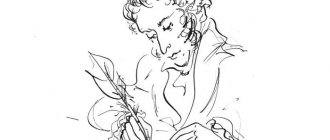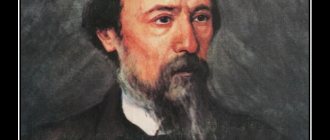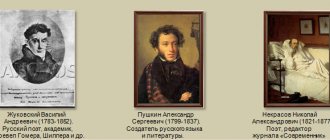Quotes from Evgeny Onegin
Alexander Sergeevich Pushkin is a brilliant writer, as you can see by reading one of his most popular works. We are talking about the poetic masterpiece “Eugene Onegin”. The book, which condemns the order of life that dooms extraordinary people to spiritual destruction, won the hearts of not only Russian readers, but foreign “bookworms.”
Considering all of the above, it is not surprising that quotes from Eugene Onegin are so popular. The best of them are presented in our collection.
We honor everyone with zeros, and ourselves with ones.
He who lived and thought cannot help but despise people in his soul.
I love you (why lie?), But I am given to someone else; I will be faithful to him forever.
We all learned a little bit. Something and somehow.
The less we love a woman, the easier it is for her to like us.
They got along. Wave and stone, poetry and prose, ice and fire are not so different from each other.
Everyone in the world has enemies, but God save us from friends! These are my friends, my friends! It’s not for nothing that I remembered them.
You can be a smart person and think about the beauty of your nails.
Always as cheerful as the morning, as simple-minded as the life of a poet, as sweet as love’s kiss.
Vladimir Lensky
Vladimir Lensky
Young nobleman 18 years old, attractive appearance, rich:
“...Almost eighteen years old...”
“...Handsome, in full bloom...”
“...And shoulder-length black curls...”
“...rich, good-looking...”
Parents died:
“...and there, with the inscription of a sad father and mother, in tears, he honored the patriarchal ashes...”
Philosopher and poet:
“...an admirer of Kant and a poet...”
An enthusiastic nature, even to the point of exaltation, not fully formed:
“...and a mind still unsteady in judgment, and an eternally inspired gaze...”
“...freedom-loving dreams, an ardent and rather strange spirit, always an enthusiastic speech...”
He came from Germany straight to the village, because he does not accept the rules by which high society exists:
“...he brought the fruits of learning from foggy Germany...”
“...I hate your fashionable world, I prefer the home circle...”
Trusting and simple-minded:
“...he innocently exposed his trusting conscience...”
Believes in friendship and loyalty:
“...he believed that his friends were ready to accept his chains for honor...”
“...there are sacred friends chosen by the destinies of people...”
Rural society perceives him as an eligible bachelor:
“...Lensky was accepted everywhere as a groom...”
However, since childhood, Vladimir was engaged to the youngest daughter of the Larins’ neighbors, Olga, and at the time of the story he was in love with her and was going to marry her:
“And the children were destined for crowns by their friends and neighbors, their fathers...”
“...the admirer Olga has arrived...”
“Oh, he loved, as in our years people don’t love anymore...”
“...he believed that his dear soul should unite with him, that, languishing joylessly, she was waiting for him every day...”
“...in two weeks the happy date was appointed”
His love is platonic in nature:
“...he was a dear ignoramus at heart...”
“... in the confusion of tender shame, he only sometimes dares, encouraged by Olga’s smile, to play with his developed curl or kiss the hem of his clothes...”
“... and meanwhile, two, three pages... he skips, blushing...”
After the challenge to a duel, seeing Olga and realizing that she doesn’t even understand what happened, Lensky forgives her and no longer takes revenge on Onegin, but only wants to protect the bride from the corrupting influence:
“...I will be her savior. I will not tolerate the corrupter tempting a young heart with fire and sighs and praises...”
Quotes from the novel in verse “Eugene Onegin” by A. S. Pushkin
- The result of Eugene’s upbringing and training was his knowledge of languages (French, Latin, Greek), history, the foundations of philosophy and economics, rules of good manners, and the ability to dance:
***
“He could express himself and write in French perfectly, danced the mazurka easily and bowed at ease.”
***
“He knew enough Latin to parse epigraphs, talk about Juvenal, put vale at the end of a letter, and he remembered, although not without sin, two verses from the Aeneid.”
***
Eugene does not like or understand poetry; on occasion, he can easily compose an epigram on the topic of the day:
***
- Onegin is distinguished by restlessness; in principle, he cannot do anything for a long time:
***
“He was a pedant in his clothes, and what we called a dandy. He spent at least three hours in front of mirrors.”
***
All these qualities of a character become the key to a favorable attitude towards him in the light of:
***
A life full of entertainment quickly gets boring for the main character; for a while, Eugene’s only passion remains love adventures, but they gradually bore him:
***
“But the whispers, the laughter of fools And here is public opinion! Spring of honor, our idol!
***
“languishing in idle leisure, without service, without a wife, without business, I did not know how to do anything.”
***
- Onegin is quite calculating. Having learned about his uncle’s imminent death, Onegin does not feel sympathy for him, but is quite ready to pretend to be so in order to receive an inheritance:
***
“Having read the sad message, Evgeny immediately galloped headlong to the post office date and was already yawning in advance, preparing himself for the sake of money, for sighs, boredom and deception.”
***
“to his caustic argument, and to the joke, with bile in half, and the anger of gloomy epigrams”
***
He perceives himself as a gloomy and indifferent person, even trying to exaggerate when speaking about his own person:
***
However, in this image there is a lot of ostentation and panache. Onegin knows how to understand people and appreciate them:
***
- “even though he knew people, of course, and generally despised them, but (there are no rules without exceptions) he distinguished others very much and respected the feelings of others”
***
“my Eugene, not respecting the heart in him, loved both the spirit of his judgments and his common sense about this and that”
***
Even his “rebuke” to young Tatyana is caused by his reluctance to cause her even greater suffering than the pain of rejection:
***
He tries to be delicate with her and tries to warn the girl against careless impulses in the future, although a share of panache and narcissism is still present in his words:
***
“Learn to control yourself; Not everyone will understand you like I do; inexperience leads to disaster"
***
- In his relationship with Lensky, realizing that they are too different for true friendship, Onegin for the time being spares the poet’s feelings and does not try to ridicule his enthusiastic ideas about life:
***
There is nobility and self-esteem in his character, and those around him recognize this:
“Wild, sad, silent, like a timid forest deer, she seemed like a stranger in her own family.”
***
Romantic and enthusiastic, she fell in love with Onegin at first sight only because:
***
Her letter to Eugene is written in French, in a very exalted tone, with pompous “bookish” turns:
***
- In fact, she writes not to a living person, but to an invented image, and deep down in her soul she understands this:
***
However, one should pay tribute to her courage. She writes, despite the fact that she is endlessly scared:
***
Over time, it turns out that the love that Tatyana feels for Evgeniy is not an easy, quickly passing love:
***
She not only cherishes unhappy love in her soul, but tries to understand Onegin’s character, comes to his abandoned village house, reads his books:
***
“And little by little my Tatyana begins to understand the one for whom she was condemned to sigh by the imperious fate.”
***
At the family council, it was decided to go to Moscow, to the “bride fair,” but Tatyana remains indifferent to social life there:
***
“They find her somewhat strange, provincial and cutesy, and somehow pale and thin, but, by the way, very pretty”
***
She gets married at the insistence of her family, without love, to a man she doesn’t like much:
***
Since her marriage, the social manners of the already reserved Tatyana acquire a shade of even friendliness towards everyone, which is impossible to look behind:
***
Not participating in any intrigues, not competing with anyone, Tatyana commands the respect of society, her husband is very proud of her:
***
In the time that has passed since her first meeting with Onegin, Tatyana has learned, on his advice, to control herself:
***
“And no matter what troubled her soul, no matter how much she was surprised and amazed, nothing changed her: she retained the same tone, her bow was just as quiet.”
***
“The princess is in front of him, alone, sitting, not dressed, pale, reading some letter and quietly shedding tears like a river.”
“and there, with the inscription of a sad father and mother, in tears, he honored the patriarchal ashes”
***
An enthusiastic nature, even to the point of exaltation, not fully formed:
***
He came from Germany straight to the village, because he does not accept the rules by which high society exists:
***
However, since childhood, Vladimir was engaged to the youngest daughter of the Larins’ neighbors, Olga, and at the time of the story he was in love with her and was going to marry her:
***
“he believed that his dear soul should unite with him, that, languishing joylessly, she was waiting for him every day”
***
“in the confusion of tender shame, he only sometimes dares, encouraged by Olga’s smile, to play with his developed curls or kiss the hem of his clothes”
***
“I will be her savior. I will not tolerate the corrupter tempting a young heart with fire and sighs and praises.”
“Before this clarity of vision, before this tender simplicity, before this playful soul!”
***
Vetrena, does not know how to behave in society, compromises both herself and her fiancé by flirting with another:
***
“Olenka jumped from the porch to meet the poor singer, like a windy hope, playful, carefree, cheerful, well, exactly the same as she was.”
***
After the death of the groom in a duel, the girl quickly falls in love with another and marries him:
10 catchphrases from the novel “Eugene Onegin” used in the 21st century
1. “...WE ALL LEARNED A LITTLE LITTLE SOMETHING AND SOMETHING, So with our upbringing, thank God, it’s no wonder for us to shine...”
Today this expression, as a rule, is used in an ironic way, talking about amateurism, shallow, superficial knowledge in any area...
2.
“What has been given to you does not attract you; the serpent constantly calls you to itself, to the mysterious tree. FORBIDDEN FRUIT IS FOR YOU, AND WITHOUT IT, PARADISE IS NOT PARADISE FOR YOU.”
3.
Where, where have you gone, the golden days of my spring? WHAT DOES THE COMING DAY PREPARE FOR ME? My gaze catches him in vain, He lurks in the deep darkness.
A favorite and often mentioned phrase by domestic magicians, sorcerers, fortune tellers and other charlatans. But hardly any of these people know that this line became especially popular thanks to “Lensky’s aria” in the production of P. I. Tchaikovsky’s opera (1878).
4.
THE LESS WE LOVE A WOMAN, THE EASIER WE LIKE US, AND the more surely we destroy her Amidst seductive networks.
The phrase has become truly popular. Contemporaries usually say not “easier,” as in Pushkin, but “more.” It is noteworthy that the poet expressed this idea with the same comment a year before the creation of the novel (1822) in a letter to his brother, Lev Sergeevich: “The less you love a woman, the more surely you master her. But this pleasure is worthy of an old monkey of the 18th century”...
5.
“AND HAPPINESS WAS SO POSSIBLE, So close!.. But my fate has already been decided. Perhaps I acted carelessly...
Quote from Tatiana's monologue (Chapter 8, stanza 47). In this monologue, Tatyana confesses her love to Eugene Onegin, but says that she got married and, like a faithful wife, will remain faithful to her husband.
The expression became especially popular after the production of the opera “Eugene Onegin” by P. I. Tchaikovsky. These words are heard in the final duet of Onegin and Tatiana. By the way, the monologue ends with another catchphrase:
I love you (why lie?), But I am given to someone else; I will be faithful to him forever."
6.
"LOVE FOR ALL AGES; But Her impulses are beneficial to young, virgin hearts, Like spring storms to the fields:
In the rain of passions they become fresh, And they are renewed, and they ripen - And the mighty life gives And lush flowers and sweet fruit.
But at a late and barren age, At the turn of our years, The dead trace of passion is sad: So the storms of cold autumn
They turn the meadow into a swamp and expose the forest around.”
A classic example when a phrase is taken out of context and today in most cases it is used inappropriately. If you read the entire stanza from beginning to end, it will become clear that Alexander Sergeevich expressed his thought in a different way, similar in meaning to the quote from the famous ancient Roman poet Ovid: “An ugly phenomenon is senile love!”
In P. I. Tchaikovsky’s opera “Eugene Onegin” these lines were included in the aria of Gremin, Tatiana’s husband. Pushkin deliberately ironized about the ardent, youthful feelings of a middle-aged man. It’s interesting that today people pay attention to the age difference only when one of the lovers is well over 60 or 70. When a 40-year-old man marries a 20-year-old girl, there is much less criticism...
7.
How often in sorrowful separation, In my wandering fate, Moscow, I thought about you! MOSCOW... HOW MUCH IN THIS SOUND MEANS FOR THE RUSSIAN HEART! How much resonated with him!”
The favorite phrase of every Moscow tour guide, which does not lose its relevance. Yes, Moscow is no longer white-stone, huge and vast, wildly modern, but we will never stop admiring the capital.
The novel describes how Tatyana Larina's mother decided to leave for Moscow for the winter, taking Tatyana with her. The poet describes the approach of the Larin family to Moscow.
8.
But there is no friendship between us either. Having destroyed all prejudices, WE RECOGNIZE EVERYONE AS ZEROS, AND OURSELVES AS ONES. We all look at Napoleons; There are millions of two-legged creatures. For us there is only one weapon...
As a rule, the phrase is used in a humorous and ironic manner: about an ambitious, vain, arrogant person. And also self-ironicly: about his far-reaching plans, plans...
9.
WHO HAS LIVED AND THOUGHT CANNOT NOT DESPITE PEOPLE IN THEIR SOUL...
This phrase has migrated into the 21st century, slightly giving way to another phrase that even more clearly expresses the relevance of modern life: “The more I get to know people, the more I love dogs.”
10.
.I was torn and cried at first, I almost divorced my husband; Then I took up housekeeping, got used to it and became happy. HABIT FROM ABOVE WE ARE GIVEN A SUBSTITUTE FOR HAPPINESS.
Pushkin borrowed a phrase about family life from Chateaubriand’s novel “Rene.” In the original it goes like this: “If I had the temerity to still believe in happiness, I would look for it in habit.”
In the understanding of modern institutions of marriage and family, the phrase is less in demand and used than, for example, in the middle of the 20th century. For a modern person, finding peace of mind and peace in the usual way of family life is damned little, and in some ways boring. This is evidenced by statistics from recent years -
According to estimates by the All-Russian Center for the Study of Public Opinion (VTsIOM), more than half of all marriages break up every year. Divorce in modern society is a natural event, the norm. Every fourth person, and this, by the way, is about 27% of Russians, is ready to get a divorce.
Characteristics of the image of Tatyana Larina in the novel
Tatyana Larina is the main character of the novel by A.S. Pushkin "Eugene Onegin". The author created her as passionate and capable of truly loving. In the provincial town where the novel is described, Tatyana seems like a complete stranger. She prefers quiet solitude with a book to games and going out. Having read French novels, she found her ideal in the visiting metropolitan “dandy” Eugene Onegin. Unable to hide her feelings, she writes a love confession to the hero, which characterizes her as a fearless and selfless girl.
A few years later, when she meets her former lover, her love has not yet faded, but Tatyana cannot reciprocate his sudden love. The girl is married, albeit to an unloved, but good man. She is ready to sacrifice herself, but will never hurt another person. This act characterizes her as a strong-willed matured woman.
Characteristics of Onegin in the novel “Eugene Onegin” (with quotes)
How early he could be a hypocrite, conceal hope, be jealous, dissuade, force to believe, seem gloomy, languish, appear proud and obedient, attentive or indifferent.
***
Perfume in cut crystal; Combs, steel files, straight scissors, curved ones, and thirty kinds of brushes for both nails and teeth.
***
No: his feelings cooled down early; He was tired of the noise of the world; The beauties were not long the subject of his habitual thoughts; The betrayals have become tiresome; I'm tired of friends and friendship.
***
And without me the time will come; Let him live for now and believe in the world's perfection; Let us forgive the fever of youth, And youthful heat and youthful delirium.







